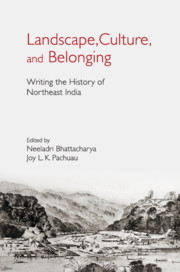Book contents
- Frontmatter
- Contents
- List of Figures
- Acknowledgements
- Introduction
- I Borders and Beyond
- II Surveys and Explorations
- III Ethnography, History, and the Politics of Representation
- IV Law, State, and Practices of Governance
- V Cultural Dialogues
- 11 Appropriating the Ao Past in the Christian Present
- 12 Why Do People Convert? Understanding Conversions to Christianity in Mizoram
- 13 From Sacred Rocks to Temples: Recasting Religion as Identity in Northeast India
- Notes on Contributors
- Index
13 - From Sacred Rocks to Temples: Recasting Religion as Identity in Northeast India
from V - Cultural Dialogues
Published online by Cambridge University Press: 26 April 2019
- Frontmatter
- Contents
- List of Figures
- Acknowledgements
- Introduction
- I Borders and Beyond
- II Surveys and Explorations
- III Ethnography, History, and the Politics of Representation
- IV Law, State, and Practices of Governance
- V Cultural Dialogues
- 11 Appropriating the Ao Past in the Christian Present
- 12 Why Do People Convert? Understanding Conversions to Christianity in Mizoram
- 13 From Sacred Rocks to Temples: Recasting Religion as Identity in Northeast India
- Notes on Contributors
- Index
Summary
Following the electoral victory of the Bharatiya Janata Party (BJP) in Assam, noted intellectual and political commentator Udayon Misra wrote an important article in the Economic and Political Weekly where he argued that the electoral victory of BJP was not a victory of Hindutva but that of identity politics, which has always been centred on immigration, land, and language. He further added that the ‘highly syncretic and plural nature of Assamese society’ makes it difficult for any kind of polarization on religious line to occur in Assam. This is a perspective that has often been articulated by various secular scholars in the region, especially Assam.
While it would be desirable to subscribe to this perspective, it seems to be born out of a reluctance to acknowledge the fact that there has been a growing consolidation and hardening of religious identities in Assam, and in other parts of northeast India, over the last several decades, and that it has had some success even in mediating and, at times, obfuscating or blurring the identity politics centred on land, livelihood, and language. If the popular media and other articulations are anything to go by, the extent to which ‘Assamese’ identity in its present form may be as much anti-Muslim and anti-Christian as anti-immigrant is something worth thinking about. The consolidation and hardening of religious identities cannot be seen as an aberration in an otherwise ‘syncretic and plural’ religious landscape. Rather, it is the product of a longer history of how religion came to be recast as identity in northeast India and it is to this history that the present chapter turns to.
This chapter traverses different communities and spaces, and points towards certain general processes and trends that have reshaped the religious and cultural landscape of the region. Not all communities or spaces in the region have been refered to in this narrative, and it has the limitations that any attempt to draw on generalities would have. Yet it is an attempt to push the understanding of the region beyond the familiar ruminations on territoriality, ethnicity, and conflict, and make sense of a process that has been hitherto unexplored.
- Type
- Chapter
- Information
- Landscape, Culture, and BelongingWriting the History of Northeast India, pp. 314 - 332Publisher: Cambridge University PressPrint publication year: 2019
- 1
- Cited by



